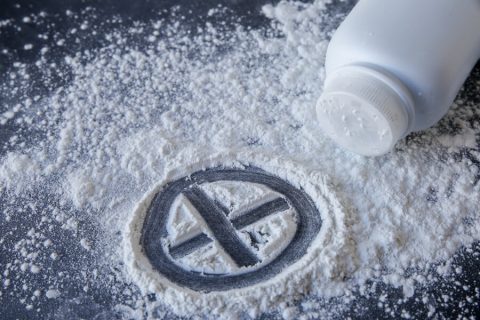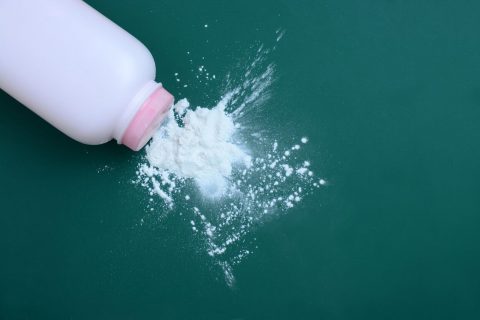Talcum Powder Recall
Johnson & Johnson’s talc supplier, Imerys Talc America, filed for bankruptcy in 2019, following 14,650 lawsuits claiming its talc contained asbestos. Johnson & Johnson recalled 33,000 bottles of Johnson’s Baby Powder in October 2019 after the FDA found small amounts of asbestos in a bottle it tested, and will stop selling it globally in 2023.
The recalled bottles were from lot #22318RB. The FDA said that it tested another sample of Johnson’s Baby Powder from another lot and found no asbestos. But in response to the recall, major retailers including Walmart, CVS and Rite Aid pulled all 22-ounce bottles from their shelves.
As of August 15, 2022, Johnson & Johnson faces more than 37,515 federal lawsuits and thousands more in state courts. These suits allege that Johnson’s Baby Powder and Shower-to-Shower talc-based products can cause ovarian cancer and mesothelioma and the company failed to warn the public.
Despite the growing number of lawsuits, Johnson & Johnson said the August 2022 decision to stop selling its iconic talc-based baby powder globally in 2023 is related to low sales and not safety issues. It is a discontinuation of the product and not a recall or market withdrawal.
The company blamed “misinformation around the safety of the product and a constant barrage of litigation advertising” for the decline in sales when it discontinued the products in the U.S. and Canada in May 2020, according to a statement.
Recall and Discontinuation Timeline
In spite of the decision to stop selling talc-based baby powder in the United States and Canada, Johnson & Johnson continues to stand by the safety of its product. The company insists that the results of thousands of tests over the past 40 years have shown its talc does not contain asbestos and is not a cancer threat.
But the company’s talc has been under the microscope for potential asbestos contamination for decades, and studies have linked talc to ovarian cancer since at least the 1970s.
Juries have awarded billions in verdicts to people who claimed Johnson’s Baby Powder and Shower-to-Shower led to cancer.
-
1950's
Earliest mentions of tainted J&J talc containing tremolite, a mineral classified as asbestos, surface in a 2018 Reuters investigation.
-
1971
A study published in BJOG: An International Journal of Obstetrics and Gynecology finds talc particles “deeply embedded” in ovarian and cervical cancer tumors.
-
1975
J&J acknowledges the link between talc use on the genitals and ovarian cancer, referring to it as the “talc ovary problem” in an internal memo released during an ovarian cancer trial in 2017.
-
1976
J&J tells the FDA that there was no asbestos in its talc tested between December 1972 and October 1973. But at least three tests from 1972 to 1975 had found asbestos in the talc.
-
1982
A case-control study in the journal Cancer finds women who used talcum powder on their genitals or sanitary napkins had a higher risk of ovarian cancer than women who did not.
-
2006
The International Agency for Research on Cancer, an arm of the World Health Organization, lists genital talc use as “possibly carcinogenic to humans.” J&J’s talc supplier, Imerys, begins adding warnings about genital talc use and ovarian cancer in its shipments to J&J.
-
2011
A study by Dr. Daniel W. Cramer and colleagues finds long-term talcum powder use increased ovarian cancer risk by 30 percent. Women who used it the longest had the greatest risk.
-
2016 to 2017
Juries award verdicts of $72 million, $55 million, $70 million, $110 million and $417 million to women who claimed Johnson & Johnson’s talc-containing products caused their ovarian cancer. Some of these verdicts were overturned on appeal.
-
2018
FDA begins testing cosmetic talc products for traces of asbestos, including talc-containing makeup.
-
April 2018
A jury awards $117 million to a man who claimed asbestos-contaminated Johnson’s Baby Powder and Shower-to-Shower led him to develop mesothelioma.
-
July 2018
A jury awards $4.17 billion to 22 women who claimed Johnson & Johnson’s asbestos-contaminated talc products caused them to develop ovarian cancer.
-
February 2019
Johnson & Johnson’s talc supplier, Imerys Talc America Inc., files for bankruptcy after it was hit with about 14,650 suits claiming its talc contained asbestos.
-
July 2019
The U.S. Justice Department begins a criminal investigation into whether or not Johnson & Johnson lied about the cancer risk linked to its talc-based products.
-
August 2019
Johnson & Johnson questions the reliability of plaintiffs’ experts and science linking talcum powder to cancer. The company previously called studies linking cancer to talc “junk science.” The judge must decide whether the plaintiffs’ experts’ opinions and science can be presented to a jury.
-
October 2019
After the FDA found asbestos in a sample of Johnson’s Baby Powder, Johnson & Johnson recalls thousands of bottles of baby powder from lot #22318RB.
-
April 2020
In a Daubert ruling, U.S. District Judge Freda Wolfson finds that plaintiffs’ experts’ opinions on talcum powder and cancer are “substantially supported by the science” and will allow them to present their opinions to a jury.
-
May 2020
Johnson & Johnson stops selling talc-based baby powder in the U.S. and Canada.
How Discontinuation Affects Talc Litigation
Trent Miracle, a trial attorney and pharmaceutical litigation expert with Simmons Hanley Conroy, told Drugwatch the company’s decision to stop selling its talc-based baby powder could lead to more lawsuits.
“Many people may [still] have been unaware of the link between talcum powder usage and cervical cancer but the discontinuation was fairly big news and put a new highlight on that link,” said Miracle, who has been at the forefront of talcum powder litigation. “This could result in many more people with a cervical cancer diagnosis contacting attorneys, resulting in a larger amount of litigants.”
In addition to more litigants, Miracle said the discontinuation could prompt more law firms to “feel more confident about the litigation” and become a part of it.
After the April 27, 2020, Daubert ruling by U.S. District Judge Freda Wolfson allowed plaintiffs’ experts to present their science to a jury, Miracle said the next step is to prepare for trial.
“At this point it is reasonable to assume the court will start a process whereby it decides which plaintiff cases will go to trial first and set trial dates,” he said. “These initial cases are typically referred to as bellwethers since the point of trying a few cases out of the thousands on file is to, in theory, educate the litigants of the potential value of these cases potentially helping to inform settlement discussions.”
Combined with the Daubert ruling, Miracle said Johnson & Johnson’s decision to stop selling talc-based baby powder could strengthen the plaintiffs’ case at trial and beyond.
“Since the product is no longer on the market, J&J has somewhat less incentive to ‘go to the mat’ defending the product since it is no longer a revenue stream for the company,” he said.
The fact that the company stopped selling the product could also be used against J&J “frequently and effectively” at trial. The recall, discontinuation and Daubert ruling greatly improve the chances for settlement talks, Miracle added.
Can You Still Buy Talc-Based Baby Powder?
Johnson & Johnson said that it will phase out its talc-based baby powder in the months following its announcement. Existing inventory will remain on the shelves until it runs out, and the company will continue to sell the powders in other markets outside the United States and Canada.
Johnson & Johnson’s decision to stop selling its products doesn’t affect other talc-based baby powder products. Consumers could potentially purchase other brands of talc-based baby powder.
Some of these powders — such as Angel of Mine Baby Powder sold at Dollar Tree and Spring Fresh Powder sold at Walmart — include warnings that talcum powder application to the female genital area may increase ovarian cancer risk.
Consumers looking for an alternative to talcum powder can use Johnson & Johnson’s cornstarch-based baby powder which will remain on the market.
Other alternatives to talcum powder include arrowroot starch-based powders and tapioca starch-based powders.
Calling this number connects you with a Drugwatch representative. We will direct you to one of our trusted legal partners for a free case review.
Drugwatch's trusted legal partners support the organization's mission to keep people safe from dangerous drugs and medical devices. For more information, visit our partners page.





